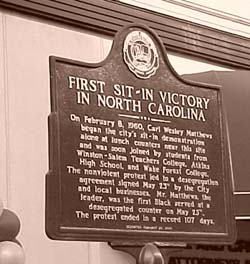UNC-TV to air documentary on lunch counter sit-in produced by WFU professors
 A documentary produced by two Wake Forest University professors on the Winston-Salem lunch counter sit-in of 1960 will be aired on public television station UNC-TV on Sept. 29 at 11 p.m.
A documentary produced by two Wake Forest University professors on the Winston-Salem lunch counter sit-in of 1960 will be aired on public television station UNC-TV on Sept. 29 at 11 p.m.
“I’m Not My Brother’s Keeper: Leadership and Civil Rights in Winston-Salem, North Carolina” was written and directed by Mary Dalton, assistant professor of communication.
Dalton co-produced the video with Susan Faust, adjunct instructor in communication. It will be part of “North Carolina Visions,” a UNC-TV series in its seventh season that spotlights local filmmakers in the state.
The 45-minute documentary relives through interviews and narration the Winston-Salem Woolworth’s lunch counter sit-in, where black students from Winston-Salem State University and white students from Wake Forest University joined together to protest segregated lunch counters. The historic sit-in took place on Feb. 23, 1960, and led to a desegregation agreement among local merchants in Winston-Salem – the first lunch counter victory in the South.
“Susan and I have felt strongly that these folks should be recognized for their courage and conviction, and we wanted their story to speak to another generation,” Dalton said. “I tried to present a story that would inspire students and let them know that they, too, can make a difference when they do the right thing and work for social change.”
With help from the Fund for Ethics and Leadership at Wake Forest, Dalton and Faust sent copies of the documentary to every public library in North Carolina, including public university and community college libraries. They also contributed copies of the video to all middle schools in the Winston-Salem/Forsyth County School System, to be included in their North Carolina curriculum.
Wake Forest, Winston-Salem State and the city of Winston-Salem celebrated the 41st anniversary of the sit-in in February with the debut of “I’m Not My Brother’s Keeper” at Wake Forest and a downtown program that addressed the past, present and future of race relations in the city.
“By choosing to walk into a department store together and sit at a lunch counter as peers-on the surface a simple act-these students ultimately changed the way we live in Winston-Salem,” Dalton said. “It’s a powerful story and I hope that people who encounter it will feel engaged politically and motivated to act for social justice.”
EDITOR’S NOTE: To request a copy of the documentary or to arrange an interview with Dalton and Faust, contact the News Service.
Categories: Arts & Culture, Community Impact, Happening at Wake, University Announcements
Media Contact
Wake Forest News
media@wfu.edu
336.758.5237


